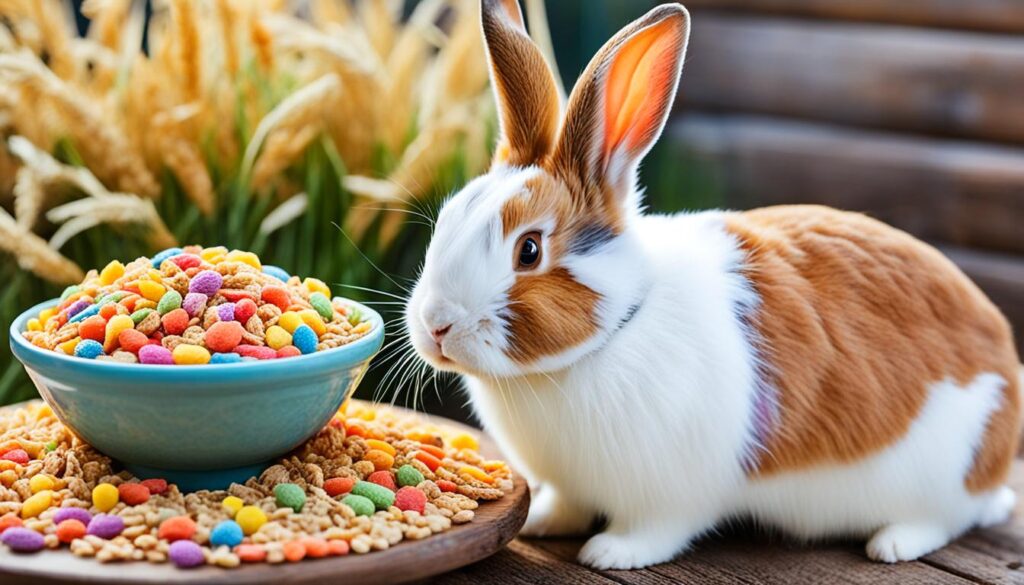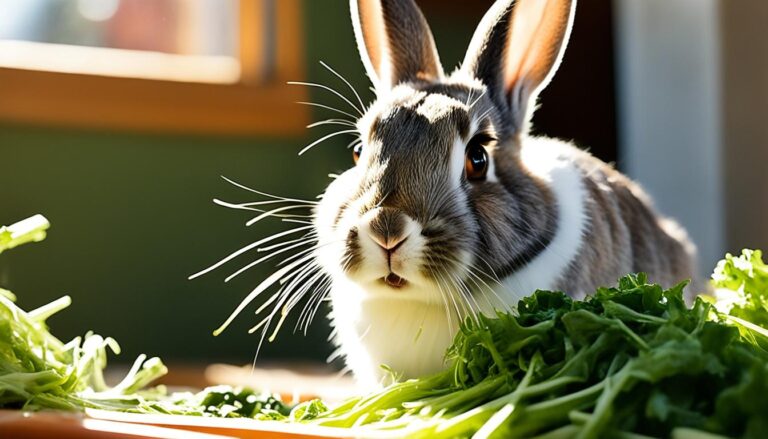Foods You Should Never Feed Your Bunny: Did you know that there are certain foods that can be dangerous for rabbits? These seemingly harmless treats can disrupt their digestion and even be potentially poisonous to them. As a responsible rabbit owner, it’s essential to be aware of what not to feed your bunny to ensure their health and well-being.
In this ultimate guide, I will provide you with a comprehensive list of foods that you should never feed your bunny. By following these bunny-safe diet tips, you can ensure that your furry friend stays happy and healthy. Let’s dive in and discover the prohibited foods for rabbits and the harmful substances you should avoid!
Foods You Should Never Feed Your Bunny: Key Takeaways:
- Avoid feeding your bunny yogurt drops, as they have been found to contribute to lethal cases of enterotoxemia.
- High-carb sugary treats like bread, pasta, cookies, and crackers can lead to stomach issues and potential enterotoxemia in rabbits.
- Never feed your bunny avocado, as it is a fatty fruit that can be deadly if ingested.
- Feeding cereals, especially muesli, to rabbits can cause tooth and tummy problems. Stick to a diet of high-quality hay, fresh vegetables, and herbs.
- Avoid offering iceberg lettuce to your bunny, as it contains a harmful chemical called lactucarium and lacks nutritional value. Opt for dark leafy greens instead.
Yogurt Drops
Yogurt drops are a popular choice for bunny owners when it comes to treating their furry friends. However, it’s essential to be aware of the potential risks associated with these seemingly harmless treats. Recent studies have shown a link between yogurt drops and the development of a condition called enterotoxemia in rabbits.
Enterotoxemia is characterized by the overgrowth of toxic bacteria in the intestinal tract, which can have severe consequences for your bunny’s health. While further research is needed to fully understand the mechanism behind this association, it’s crucial to exercise caution when feeding your rabbit yogurt drops.
Instead of yogurt drops, consider healthier alternatives that provide your bunny with both taste and nutrition. Green peppers and Brussels sprouts, for example, make excellent treats for bunnies. They are low in sugar and rich in essential vitamins and minerals that contribute to your bunny’s overall well-being.
| Treat Option | Nutritional Benefits | Serving Size |
|---|---|---|
| Green peppers | High in vitamin C and fiber | Small slices, 1-2 times a week |
| Brussels sprouts | Rich in vitamin K and antioxidants | 1-2 sprouts, 1-2 times a week |
These healthy treats not only provide your bunny with essential nutrients, but they also contribute to their overall dental health and digestive system. Remember that moderation is key when it comes to treating your bunny, and always consult with a veterinarian about the most suitable treats for your specific rabbit.
Providing your bunny with healthy treats is an important part of their overall diet. By understanding the potential risks of yogurt drops and opting for healthier alternatives, you can ensure the well-being and longevity of your beloved furry friend.
High-Carb Sugary Treats
If you love spoiling your bunny with treats, it’s essential to be mindful of what you’re feeding them. High-carb sugary treats such as bread, pasta, cookies, and crackers may seem harmless, but they can actually cause stomach issues in rabbits. These foods are packed with carbohydrates and sugar, which can disrupt a rabbit’s delicate digestive system.
Sustained consumption of high-carb sugary treats can potentially lead to enterotoxemia, a condition where harmful bacteria overgrow in the intestinal tract. Enterotoxemia can cause serious health problems for your bunny, so it’s crucial to avoid feeding them foods that are high in sugar or artificial ingredients.
The Impact of High-Carb Sugary Treats on Rabbits
Rabbits have a unique digestive system that relies on a high-fiber diet. Foods rich in carbohydrates and sugar can upset the balance of their digestive system, leading to stomach issues like bloating, diarrhea, and gastrointestinal discomfort. Additionally, the excessive consumption of high-carb sugary treats can contribute to the development of enterotoxemia, endangering your bunny’s well-being.
To maintain your bunny’s digestive health and prevent the risk of enterotoxemia, it’s important to opt for healthier alternatives when giving them treats. Instead of bread, pasta, cookies, or crackers, consider offering them fresh vegetables like carrots or leafy greens as an occasional snack.
Recommended Treats for Rabbits
When looking for suitable treats for your bunny, focus on options that are low in sugar, high in fiber, and mimic their natural diet. Here are a few examples:
- Carrot tops: These leafy greens are not only safe for rabbits but also provide them with essential vitamins and minerals.
- Blueberries: These juicy berries are packed with antioxidants and are a great occasional treat for rabbits.
- Parsley: Rabbits enjoy the taste of parsley, which also offers valuable nutrients and supports their dental health.
- Basil: This aromatic herb is safe and flavorful for rabbits, adding variety to their diet.
Remember, moderation is key when it comes to treats for your bunny. Always consult with a veterinarian to ensure that the treats you choose align with your rabbit’s specific dietary needs and overall well-being.
| Treat | Nutritional Benefits | Recommended Serving |
|---|---|---|
| Carrot tops | High in fiber, vitamins A and K | A small handful |
| Blueberries | Rich in antioxidants and vitamin C | A few berries |
| Parsley | Packed with vitamins A, C, and K | A few sprigs |
| Basil | Contains vitamins A and K, plus essential minerals | A few leaves |
Avocado
While fresh fruits and veggies are often included in a rabbit’s diet, avocado should never be fed to bunnies. Avocado is a fatty fruit that can be deadly for rabbits. It’s important to avoid feeding any part of the avocado to your bunny to prevent any potential harm.
| Fruit/Vegetable | Serving Size | Carbohydrates (g) | Fat (g) | Protein (g) | Calcium (mg) | Phosphorus (mg) |
|---|---|---|---|---|---|---|
| Avocado | 100g | 8.53 | 14.66 | 2 | 12 | 25 |
Cereal

Feeding your rabbit cereals, such as muesli, can lead to tooth and tummy problems. Cereal made up of flaked maize, peas, pellets, grains, and seeds can be difficult for rabbits to digest properly. It’s best to stick to a diet of high-quality Timothy hay, fresh vegetables, and herbs for optimal digestion.
Rabbits have sensitive digestive systems, and feeding them cereals like muesli can cause various concerns. The combination of flaked maize, peas, pellets, grains, and seeds can result in difficulties in digestion for rabbits. This can lead to tooth and tummy problems, affecting their overall health. To ensure proper digestion, it’s crucial to prioritize their diet by focusing on high-quality Timothy hay, fresh vegetables, and herbs that provide essential nutrients and promote digestive health.
Opting for high-quality Timothy hay ensures that rabbits receive the necessary fiber for a healthy digestive system. Fresh vegetables and herbs not only provide additional nutrients but also aid in keeping their teeth in good condition. Incorporating a variety of vegetables, such as leafy greens and herbs, into their diet enhances their overall well-being and prevents tooth and tummy problems.
Benefits of a Timothy Hay, Vegetable, and Herb Diet
- Promotes proper digestion
- Provides essential nutrients
- Safeguards dental health
- Enhances overall well-being
Cereal vs. Timothy Hay, Vegetables, and Herbs
| Cereal | Timothy Hay, Vegetables, and Herbs |
|---|---|
| Difficult to digest | Optimal digestion support |
| Can cause tooth and tummy problems | Promotes dental health and proper digestion |
| Limited nutritional value | Provides essential nutrients |
By prioritizing a diet of Timothy hay, fresh vegetables, and herbs, you can ensure that your rabbit maintains a healthy digestive system and avoids tooth and tummy problems. Opting for high-quality, rabbit-specific food sources is crucial for their overall well-being and longevity.
Iceberg Lettuce
When it comes to feeding your rabbit, it may come as a surprise to learn that light-colored lettuce, including iceberg lettuce, should be avoided. Iceberg lettuce can contain lactucarium, a harmful chemical that can have negative effects on your bunny’s health if consumed in large quantities.
Furthermore, iceberg lettuce has little nutritional value and primarily consists of water, offering little to no nutrition to your rabbit’s diet. It’s important to provide your furry friend with a well-rounded and balanced diet that includes essential nutrients.
To ensure your rabbit receives proper nutrition, it’s best to substitute iceberg lettuce with dark leafy greens and high-fiber fruits and vegetables. These options not only provide more vitamins and minerals but also contribute to your rabbit’s overall digestive health.
| Iceberg Lettuce | Dark Leafy Greens | |
|---|---|---|
| Nutritional Value | Low | High |
| Vitamin Content | Minimal | Abundant |
| Fiber Content | Low | High |
| Water Content | High | Moderate |
As you can see from the table, dark leafy greens offer more nutritional value, higher vitamin content, increased fiber content, and a moderate water content compared to iceberg lettuce.
By making this simple substitution, you can ensure that your rabbit receives the necessary nutrients for optimal health and well-being.
Hamster Food

When it comes to providing nutrition for rabbits, hamster food falls short. Hamster food is not suitable for rabbits and does not fulfill their dietary needs. A high-fiber diet consisting of Timothy hay, fresh vegetables, and herbs is essential for the overall health of rabbits.
Rabbits require a diet rich in fiber to maintain proper digestion and prevent digestive problems. Timothy hay is a crucial component of their diet, providing the necessary fiber and promoting healthy gut function. Additionally, fresh vegetables and herbs offer a variety of nutrients, vitamins, and minerals that are vital for their well-being.
It is important to provide your bunny with a diet specifically tailored to their dietary requirements to ensure they receive sufficient nutrition. While hamster food may be suitable for hamsters, it does not meet the high-fiber needs of rabbits. Feeding your bunny a hamster food diet could result in insufficient nutrition and possible health issues.
By prioritizing Timothy hay, fresh vegetables, and herbs in your rabbit’s diet, you can ensure they receive the necessary nutrients for optimal health. Incorporate a variety of leafy greens like kale, spinach, and romaine lettuce, as well as herbs like parsley and cilantro to provide a balanced and nutritious diet.
Remember, your bunny’s health depends on the food you provide. Opt for a high-fiber diet consisting of Timothy hay, fresh vegetables, and herbs to support their overall well-being.
Walnuts
Walnuts are a popular snack enjoyed by many, but they are not suitable for bunnies. These nuts are high in fat, which can cause uncomfortable indigestion in rabbits. Feeding your bunny walnuts may lead to digestive issues and discomfort.
To ensure your bunny’s digestive health, it’s best to avoid feeding them walnuts altogether. Instead, opt for healthy snacks that are safe and beneficial for bunnies. Fresh vegetables and herbs are excellent alternatives to walnuts, providing essential nutrients without the risk of indigestion.
By offering your bunny a variety of fresh vegetables and herbs as snacks, you can ensure they receive a well-balanced and healthy diet. These options provide important vitamins and minerals that contribute to your bunny’s overall well-being. Additionally, the high fiber content of vegetables and herbs supports healthy digestion in rabbits.
Healthy Snack Ideas for Bunnies
If you’re looking for healthy snacks to add to your bunny’s diet, consider the following options:
- Carrots
- Parsley
- Broccoli
- Kale
- Romaine lettuce
- Cilantro
- Basil
These snacks not only provide essential nutrients but also offer a variety of flavors and textures to keep your bunny engaged and satisfied. Remember to introduce new foods gradually and monitor your bunny’s reaction to ensure they tolerate them well.
| Healthy Snack | Nutritional Benefits |
|---|---|
| Carrots | Rich in vitamin A, supports eye health |
| Parsley | High in vitamin C, aids in immune function |
| Broccoli | Good source of fiber and vitamin K |
| Kale | Packed with antioxidants and vitamin C |
| Romaine lettuce | High water content, helps maintain hydration |
| Cilantro | Rich in antioxidants and supports digestion |
| Basil | Contains essential oils that provide antimicrobial properties |
Remember to always provide fresh water for your bunny to stay hydrated, as well as a constant supply of high-quality Timothy hay, which serves as a staple in a rabbit’s diet.
By choosing the right snacks for your bunny and prioritizing their digestive health, you can ensure they lead a happy and healthy life.
Oatmeal
While oatmeal is not necessarily harmful to rabbits, it is considered a suboptimal meal for them. Rabbits require a diet that consists primarily of Timothy hay, hearty greens, and fresh water to maintain their health and well-being.
Oatmeal lacks the necessary nutrients and fiber that are essential for a rabbit’s digestive system. It is important to prioritize their dietary needs by focusing on providing them with an abundance of Timothy hay, which is rich in fiber and helps promote proper digestion.
Additionally, rabbits thrive on a variety of hearty greens such as kale, collard greens, and parsley. These greens provide essential vitamins and minerals that oatmeal lacks.
Water is also crucial for a rabbit’s overall health. Fresh, clean water should always be available to ensure they stay properly hydrated.
Overall, while oatmeal may be enjoyed by humans, it is best to refrain from including it in a rabbit’s diet. Prioritizing Timothy hay, hearty greens, and fresh water will provide your bunny with the necessary nutrition for a healthy and happy life.
Recommended Dietary Plan for Rabbits:
- 70-80% Timothy hay
- 10-15% Fresh vegetables (such as kale, parsley, and bell peppers)
- 5-10% High-fiber pellets
- A constant supply of fresh water
| Food | Nutritional Value |
|---|---|
| Oatmeal | Lacks essential nutrients and fiber |
| Timothy Hay | High in fiber; promotes digestive health |
| Hearty Greens | Rich in vitamins and minerals; supports overall well-being |
| Fresh Water | Essential for proper hydration |
Conclusion
Providing an optimal diet is crucial for the health and well-being of your bunny. By avoiding the prohibited foods mentioned in this ultimate guide, you can ensure that your rabbit’s digestive system remains healthy and free from any potential harm. A balanced rabbit diet should consist of high-quality Timothy hay, fresh vegetables, herbs, and rabbit-specific pellets to provide the necessary nutrition and fiber for their overall wellness.
Optimal care for your bunny involves making informed decisions about their diet. Remember, the health of your bunny relies on the foods you choose to feed them. Provide a variety of fresh vegetables and herbs to promote a rich and diverse diet. Additionally, ensure access to clean and fresh water at all times to keep your bunny hydrated.
By prioritizing a proper rabbit diet and taking the necessary precautions, you can ensure your bunny’s health and well-being are maintained. Consult with your veterinarian for specific dietary recommendations and guidelines to tailor the care of your bunny. Remember, a healthy rabbit is a happy rabbit!
FAQ
Can rabbits eat yogurt drops?
Can rabbits eat high-carb sugary treats?
Is avocado safe for rabbits to eat?
Can rabbits eat cereal?
Is iceberg lettuce safe for rabbits?
Can rabbits eat hamster food?
Can rabbits eat walnuts?
Is oatmeal good for rabbits?
What is the key to a rabbit’s diet?
How important is a bunny’s diet for their health?
References on Bunnies or Rabbits
| Organization | Website URL |
| House Rabbit Society (HRS) | https://rabbit.org |
| Rabbit Welfare Association and Fund (RWAF) | https://rabbitwelfare.co.uk |
| RSPCA (Royal Society for the Prevention of Cruelty to Animals) | https://www.rspca.org.uk/adviceandwelfare/pets/rabbits |
| Vancouver Rabbit Rescue and Advocacy (VRRA) | https://vrra.ca |






[…] balanced and nutritious diet is vital for the health and vitality of Aidi dogs. Feed them high-quality dog food that is suitable for their age, size, and activity level. Consult with a veterinarian to determine […]
[…] mean your guinea pig needs more vitamins or fiber. It’s smart to see your vet often, who can guide you on what to feed your guinea pig based on these […]